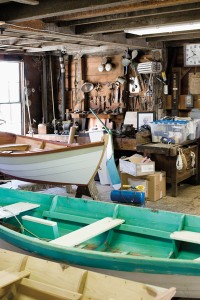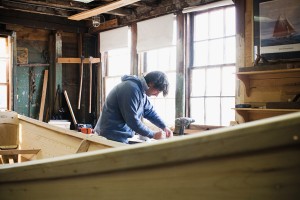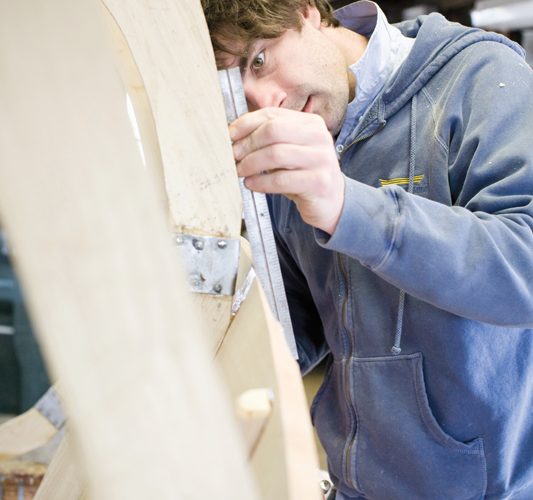Lowell’s Boat Shop preserves the art of handcrafting skiffs in Amesbury.
At the edge of the mighty Merrimack in Amesbury, where a small bend in the river makes the water seem almost like a harbor before rushing out of sight toward Newburyport and the Atlantic Ocean, sits Lowell’s Boat Shop. The river sparkles in the soft spring sunlight, providing a striking blue backdrop against the red shop. A wooden skiff, seemingly plucked from a Winslow Homer painting, bobs in the water.
Any sense of being part of a placid painting is erased the moment you step through the shop’s narrow wooden door. Inside, the place is alive, heaving with the sounds of sanding, hammering, and pounding, exhaling sawdust and the smell of cedar.
“When you come here, this place attacks all of your senses, and that would include your heart, in my case,” says Pamela Bates, executive director of Lowell’s Boat Shop.
Lowell’s has been building wooden boats since Simeon Lowell established the shop in 1793, making it the oldest continually operating boat shop in the country. It is credited with introducing the Surf Dory in the late 1700s and the Banks Dory in the 1800s. Bates says the Banks Dory revolutionized the fishing industry by allowing fishermen to stack multiple boats on the deck of a schooner and launch them all at once, rather than going out one by one in individual boats.
Today, Lowell’s is a National Historic Landmark and a nonprofit working museum. But don’t let those distinctions fool you; Lowell’s might not be cranking out over 2,000 dories like it did in 1911, but it is still an operating shop, building custom dories and skiffs for people around the country. The place is heavy with history, yet the past and present live side by side. The tools have changed over the centuries and the techniques have been refined, yet the end result is still the same: handcrafted wooden boats that are the gold standard in the industry.
“Lowell’s is to wooden boats as Hermes is to handbags,” Bates says. “We make the highest quality wooden boats that you can buy.”
 The phrase “living history” tends to conjure up images of men and women churning butter in Colonial garb, so it might be a little misleading to describe Lowell’s Boat Shop that way. But the people at Lowell’s are living the shop’s history in the truest sense, considering themselves stewards of the place, practicing and passing on its traditions rather than simply replicating them.
The phrase “living history” tends to conjure up images of men and women churning butter in Colonial garb, so it might be a little misleading to describe Lowell’s Boat Shop that way. But the people at Lowell’s are living the shop’s history in the truest sense, considering themselves stewards of the place, practicing and passing on its traditions rather than simply replicating them.
“It has a uniqueness that can’t be matched. This is not recreated. It is completely authentic,” Bates says.
The Lowell family owned the shop until 1976, when Ralph Lowell sold it to the Odell family, who was responsible for getting the shop onto the National Register of Historic Places and having it declared a National Historic Landmark. Eventually, the Newburyport Maritime Society bought the shop, turning it into a nonprofit working museum.
Bates, who has had boats on the Merrimack River for 30 years, says she used to come to Lowell’s Boat Shop to buy oarlocks. “I just liked to come here,” she says. She even joined the Newburyport Maritime society because it owned the shop. So when the Maritime Society decided to sell Lowell’s, Bates stepped in. “The boat shop needed its own focus and management,” she says. Without it, she feared the shop’s centuries-old traditions-and maybe those of Lowell’s itself-would be lost. “I said, ‘Not on this watch.'”
Bates knew that several groups were interested in buying the shop, but they were having trouble raising the money individually. “I just suggested that they sit down at the same table and see if their like minds could pull something together, and that happened,” she says. They formed the Lowell’s Maritime Foundation, which bought the shop in 2007 with the goal of “preserving and perpetuating the art and craft of building wooden boats.”
“The charge of the Maritime Foundation really is to be good stewards of Lowell’s Boat Shop and its traditions. It was formed specifically to own and operate the boat shop,” Bates says. Although the foundation has expanded its membership and board, it is still very much an organization in its infancy that is run mainly by volunteers, including Bates. A volunteer woodworking crew produces fun products like dory window boxes and planters, model dory kits, and oar-handled cheese knives to raise money for additional programming. The shop’s Dory Rescue League is also made up of volunteers who maintain the boats. Yet Lowell’s does employ one full-time boat builder, Amesbury native Graham McKay, who learned the craft of boat building as a high school student by taking a course at Lowell’s Boat Shop.
“I balanced it between playing high school basketball, and I feigned illness for a few practices, I think, to be here for class,” McKay says. Although he has an economics degree from Harvard, he found himself lured by the boats and worked part time in the shop. “If I had a weekend off, it would be what I’d want to do,” he says. “I wouldn’t want to sit around and figure out a better way to put together a mutual fund.”
So after earning a graduate degree in maritime archeology from the University of Bristol in the United Kingdom, he joined Lowell’s Boat Shop full time in December 2007. “This is essentially working maritime history. This building and this shop have been here for centuries,” he says. “I’m as interested in producing boats and receiving a paycheck as I am in making sure that this place, rather than disappears, thrives and becomes more of a household name.”
Part of the shop’s efforts to become more recognized lies in its educational programs. Lowell’s operates a year-round museum and classes in boat building, knots, model dory building, and rowing, to name a few. The boat building classes, which are the most popular, are limited to six to eight people and usually run five to eight weeks. The boat that the class builds is often sold by raffle. Whoever wins can buy the boat for a lower price than it would sell for otherwise: as little as $1,000 on a boat that could sell for more than $5,000. On average, Lowell’s boats cost between $6,000 and $12,000, although you could buy an unpainted boat with a simple design for as little as $3,500.
“Our boats are very, very labor intensive. They’re all fastened with copper rivets by hand,” Bates says. They are also made with the finest-quality materials; most of them are planked with cedar and framed with oak. According to Bates, the shop is “fussy” about its wood, favoring clear wood without knotholes. Although the boats are just as sturdy as they were in 1793, today they are more often recreational than industrial, so they are prettier, too, Bates says. The boats are enameled and finished, and most have several coats of varnish on them. They seem to be worth the investment. “Our boats will last for generations, and many families hand them down from generation to generation,” Bates says.
 Lowell’s also offers memberships, which provide discounts on classes, invitations to special events, and access to recreational rowing during open waterfront days, a perk that Bates says is not taken advantage of enough by the community. A one-year family membership costs just $60, and you do not have to own your own boat to row there. An individual membership costs $35. “Why go to a gym and use a rowing machine when you can get in a boat in a beautiful place and row in the fresh air?” Bates says.
Lowell’s also offers memberships, which provide discounts on classes, invitations to special events, and access to recreational rowing during open waterfront days, a perk that Bates says is not taken advantage of enough by the community. A one-year family membership costs just $60, and you do not have to own your own boat to row there. An individual membership costs $35. “Why go to a gym and use a rowing machine when you can get in a boat in a beautiful place and row in the fresh air?” Bates says.
McKay is also launching an expedition day program this summer, during which middle school kids will row from Lowell’s to the Essex Shipbuilding Museum over the course of a week. Along the way, they will learn about rowing, the history of the area, maritime safety, and marine science and biology, as well as how their lives will be influenced by the wind, tide, and elements while they are out on the water.
Even though Lowell’s Maritime Foundation is still new, the boat shop itself is not. The oldest buildings on the site date to the 1860s. To be sure, there are some things that are wonderful about that, like “Lowell’s Linoleum,” where the floor is layered with inches-thick paint, the product of centuries of boat painting. Yet it can be a challenge to maintain such a place. Bates says that the shop didn’t have any maintenance work for 12 years before receiving a Partners in Preservation Grant from American Express and the National Trust for Historic Preservation last year.
“The grant was all about infrastructure,” Bates says. “The roof over our paint room would not have lasted this last winter. The repairs we made to this building were of a truly critical nature.” The $86,200 in grant money allowed the shop to repair and restore all of its windows, put new siding on the east end of the building, put a new heating system in the teaching room, and paint the building red, which is likely its historic color. Bates says her future wish list for Lowell’s includes expanding the building and waterfront, as well as getting the community more involved in the shop.
One man for whom involvement in the shop is never an issue is 70-year-old John McGann, who drives 100 miles from his home in Plymouth to, as Bates says, “pat his boat.” McKay is building him a Surf Dory, and McGann comes to the boat shop every two weeks to visit, staying for about four hours and “puttering around doing things,” he says. He loves to watch his boat being made and even has had a hand in building it.
“I have riveted three planks onto that boat. Today, I sanded the mast. What role I’ll be doing the next time, I don’t know,” he says with a laugh. “Graham always has something.” McGann said he searched from Connecticut to Maine for a boat builder and settled on Lowell’s because of its history, tradition, and expertise. “It has just been an adventure for me,” he says, adding that the attraction to the dory goes deeper than an interest in rowing. “My great-grandfather was a dory man on the Grand Banks, fishing from a dory. It’s the connection with my ancestry.”
That kind of deep connection seems to be a common feeling at Lowell’s Boat Shop. “We’ve had very masculine grown men come in and say that they have arrived at Mecca. That this place has an aura about it that makes the hairs on their neck stand up,” Bates says. She herself talks about the place with a kind of reverence and says others feel the same way.
“They really feel that this is a spiritual environment, and they feel the presence of past generations here,” she says. “And without being too soupy about it, you really can’t be around this shop and not feel that there’s a lot going on here, both past and present.” Bates says that the people who work at Lowell’s might not make much-or any-money, but they’re all there for the same reason: they believe in the shop and its mission and want to bring that mission to the wider community, both local and national.
“Lowell’s should be a national entity that’s recognized worldwide. It’s one of one,” she says. “We’re the only oldest boat shop there is in the country.”
– Alexandra Pecci, photographs by Christopher Churchill

